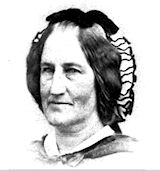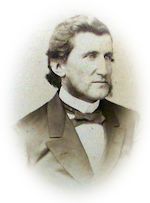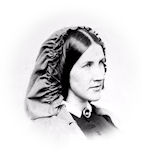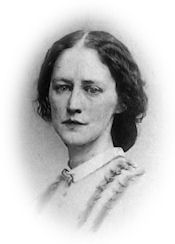 Jane Stuart Woolsey to Joe Howland.
Jane Stuart Woolsey to Joe Howland.
8 Brevoort Place, 3d May, Chi Alpha night.
So you three have met again, Georgy, Eliza and the Colonel. . . . It must have been a jolly meeting for you all on the floating Hospital, and Eliza says you showed symptoms of illness immediately on seeing the comfortable beds. But it is rather a perilous position for the girls. It is no longer visiting, but living, in an atmosphere of infection, day and night, typhoid, rubeola, gangrene, and what not. They will be in for anything going, and the service in a crowded transport will make terrible draughts on the sympathies of all concerned. We hear surmises that the Daniel Webster will come round to New York. If so, I sincerely hope the girls will come in her if possible, if it is only for a day. What an excellent thing to have these boats systematically provided, and to have ladies on board. It will go far to humanize the horrid vehicles. Heavy reproaches belong somewhere for the want of foresight and humanity in the government arrangements of the kind. I have seen it. Send your sick men, if you have any, on a Sanitary Commission transport. Fully half the complaints about the Vermonters of Lee’s Mills are strictly correct, and half are half too many for toleration. The men are in comparative paradise now in “our” (!) hands, though one or two will die in consequence of careless treatment,—Government doings. Somebody says of the barbarisms of the Chinese Tae-Pings: “if you want to complete the picture, transfer them to America and prefix the adjective Red.”
We have been having a Chi Alpha (the Clergymen’s Social Club) for Mr. Prentiss, while he was moving. I say “we” although our participation was through the key-hole alone. The last of the mild elderly gentlemen has taken his hat and cane, and the family have rushed down and wildly consumed vast quantities of sandwiches, chicken salad, and the loveliest fried oysters! Don’t you wish you had some? . . .
One of the entertainments, not edible, was a “James Projectile,” weight 58 lbs., brought in the self-sacrificing and gallant hat box of Chas. Johnson, sent by Frank Bacon as a receipt in full, I suppose, for the few little matters we have sent him from time to time,—filled and covered with the red brick dust made by the great breach.[1]

“The slave shouts in the barracoon
As through the breach we thunder!”

But never, Chas. Johnson says, never was there such a disgusted set of men as the Connecticut Seventh, when the white flag went up; they had set their hearts on storming the place, and everything was ready. He went through the casemates with F. B. (Francis Bacon) on his rounds among the patients, his own and those left to his care by Colonel Olmsted, and gave us a very interesting picture of the scene, too long and circumstantial to write out in a letter. He was very much pleased with Dr. Bacon, “so exactly the man for the place,” he said; so utterly cool, so gentle, and so untiring in care and patience. One young fellow they came to, had lost his leg, and the Doctor was trying to soothe him to sleep without an anodyne—“What part of Connecticut are you from?” asked Charles J.; “I’m a Georgian, sir. Yes, sir (kindling up), I fired the last gun from this fort, sir!” “Yes,” said the Doctor quietly, in his mesmeric way, “he stood by his gun till a shot dismounted it and hurt him. But try now to go to sleep, and if you find you cannot, I’ll give you something to help you.” “O, if I could have one drink of milk, Doctor!” “I’ll see; perhaps I can get you a little.” So he gave the candle (in a bottle) to Charles, and was gone for a quarter of an hour, coming back with a little milk in the bottom of a cup, which the young Georgian eagerly swallowed. The story is getting too long—and there were two or three others to match—but what I observe is, that a man of less fine fibre, instead of taking up the talk of the poor Georgian, would have “ improved the occasion” to him.
Did you notice that to-day, in the transactions of the Board of Brokers, when the “Government Sixes touched par,” for the first time since the rebellion, that the brokers were all on their feet in a minute giving three tremendous cheers? . . . Mother seriously announces just here, that two of the tea spoons, used by the clergymen this evening, are missing, and mentions the name of Rev. Dr. _______!
[1]On the newel post at your uncle Frank’s house in New Haven stands this projectile, fired from the battery by which he stood during the attack on Fort Pulaski. It went through the wall, and was taken out of the rubbish inside the fort by him and sent North to your grandmother.

Apropos of your Uncle Frank’s “improving the occasion” at Fort Pulaski—he did improve it in giving the rebel surgeon a merited rebuke. “Good-bye, my poor fellows,” the surgeon had said, “I don’t know what will happen to you now, I shall have to leave you to this gentleman.” “You need not have any apprehensions, sir,” F. B. answered; “these are not the first wounded Georgians I have had to care for;” and then he told him of the wounded rebels he had looked after at the battle of Bull Run. The fellow melted at once and said those men and Colonel Gardner came into his hands directly from F. B.’s, and he had heard of the kindness shown them.
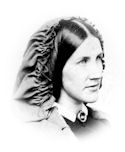 Georgeanna’s Journal.
Georgeanna’s Journal.

